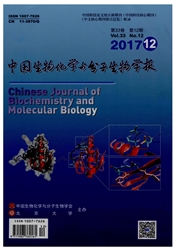

 中文摘要:
中文摘要:
杀菌/通透性增强蛋白(BPI)是存在于中性粒细胞中的阳离子蛋白,约为55 kD.BPI能与革兰氏阴性菌外膜上的脂多糖结合,增加外膜对抗菌药的通透性,具有特异性杀灭革兰氏阴性菌及结合/中和内毒素的生物学功能,在革兰氏阴性菌感染的治疗方面有良好的发展前景.近年来,国内外对BPI研究颇多,并逐渐发现BPI还具有调理作用、抗真菌、抗原虫和抑制血管生成等许多功能,被学者称为未来的"超级抗生素".本文主要就BPI的结构、分布、生理功能、作用机理及临床研究方面的研究进展作一综述.
 英文摘要:
英文摘要:
The bactericidal/permeability-increasing protein(BPI) is a multifunctional cationic protein with the molecular mass about 55 kD.BPI is stored mainly in the azurophilic granules of the poly-morphonuclear neutrophils.It binds lipopolysaccharide on the outer membrane of gram-negative bacteria and increases the membrane permeability to kill the bacteria.BPI can also neutralize and clear the endotoxins,therefore can be used in the prevention and treatment of disease derived from gram-negative bacteria infection.Recently,BPI was also found to have other functions,such as neutrophil-mediated phagocytosis related opsonic function,fungistasis,anti-protozoan parasite,and angiogenesis inhibition activities.This review focuses on the localization,the structural and functional properties of BPI,and its functions in host defense during gram-negative bacteria infections and endotoxin-induced inflammation.The clinical application of BPI was also prospected.
 同期刊论文项目
同期刊论文项目
 同项目期刊论文
同项目期刊论文
 期刊信息
期刊信息
